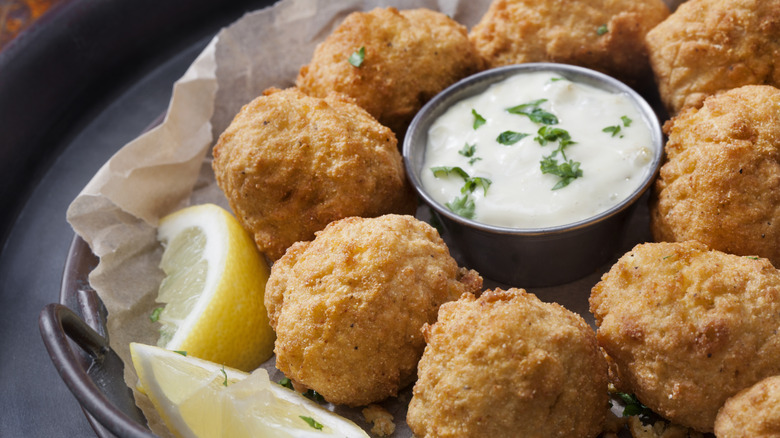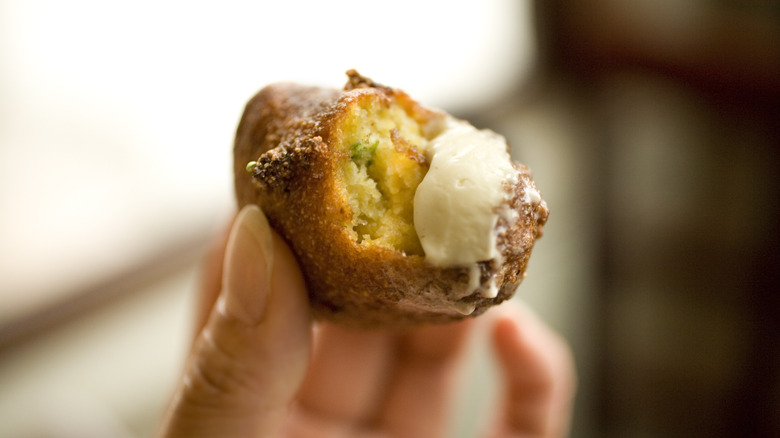What's A Hushpuppy And Why Is It Really Called That?
When you enjoy an authentic meal full of Southern food, chances are your plate is going to include a side of hushpuppies. About the size of golf balls, hushpuppies are dollops of dough made of cornmeal, egg, and water that are deep fried until crispy on the outside. They are a bit like savory donuts and they are usually paired with seafood meals like fried catfish and shrimp. But they also make appearances alongside Southern barbecue, fried chicken, and seafood gumbo. Hushpuppies beg to be noticed, if not for their incredible flavor and texture, then for the name itself.
Catchy and cheeky, with undertones of irresistible furry pets, hushpuppies are as fun to say as they are to eat. There are, in fact, several stories and theories as to how these treats got their name, but a solid, proven version has yet to be discovered. Despite popular belief, it's unlikely that the name came from fishermen trying to shush their dogs' whining or that it originated during the Civil War. It turns out, hushpuppies were originally called Red Horse Bread. In fact, the original usage of the term "hushpuppy" had nothing to do with food at all.
Hushpuppies myth versus reality
Perhaps the most well-known story of the hushpuppy involves fishermen and their dogs. As the story goes, the men would cook up their daily catch while their hungry hounds would howl at the smell of the food. In order to keep them quiet, the men would offer them fried balls of dough. Another tale suggests that, during the Civil War, Confederate soldiers were cooking food one night when Union soldiers were discovered nearby. In order to keep their noisy dogs from giving away their position, the Confederates offered the dogs pieces of fried cornmeal telling them, "Hush, puppies!"
In reality, the first mention of these deep fried fritters made of cornmeal, water, and egg was described in a dish called Red Horse Bread,which was made by Romeo "Romy" Govans, a man born into slavery in the middle of the 19th century. After the end of the Civil War, Govans settled in Cannon's Bridge, South Carolina where he hosted extremely popular fish frys that included the river redhorse species of fish. Naturally, everything was served with the fried cornmeal dumplings, thus earning the name Red Horse Bread. Govans and his food were so well known across the state that he was able to make a comfortable living. After he died in 1915, Goven's Red Horse Bread spread throughout South Carolina and was most often served with fried fish meals.
The name might have described a person's hungry stomach
The term "hushpuppy" was already in existence when Red Horse Bread came along, but it was used in a totally different context with a totally different meaning. As early as the 18th century, "hushpuppy" was used to describe keeping someone quiet or suppressing something unbecoming, like a scandal. It was also used to describe a certain type of gravy or homemade liquor. Mississippi senator H.H. Casteel noted in 1915 that pot liquor in his district was called "hushpuppy" because it kept the "houn' dawgs" from growling. Many believe he was actually referring to a person's stomach and not actual dogs.
By the 1940s, rounds of fried cornmeal dough were a southern staple and went by several different names, which varied by location, including "Red Horse Bread” in South Carolina, "Three Finger Bread" in Georgia, "wampus" in Florida, and "hushpuppy," but no one really knows how or when the fried side picked up that name. Ultimately, it became the title most associated with the dish. By 1948, hushpuppy mix was being manufactured and sold, and today, you can find the dish from coast to coast and nearly in every place that serves up a fish fry.
Naturally, throughout the years, cooks have put variations on the classic cornmeal dough; it's not unusual to find the fritters made with the addition of things like cheese, peppers, bacon, shrimp and other seafood, and fresh corn kernels. Despite the mystery behind the name, hushpuppies have become an iconic and delicious addition to revered Southern cuisine.



